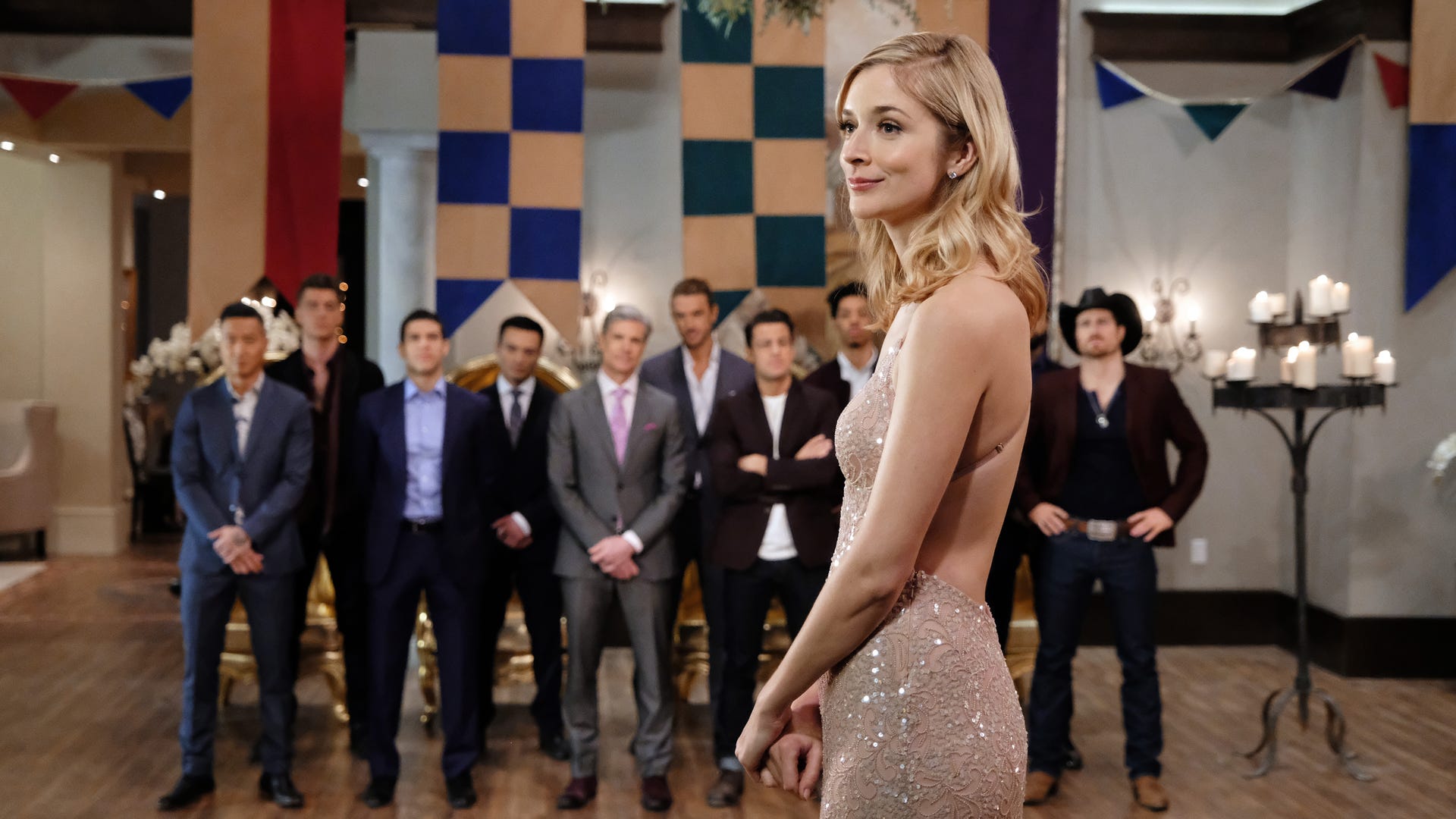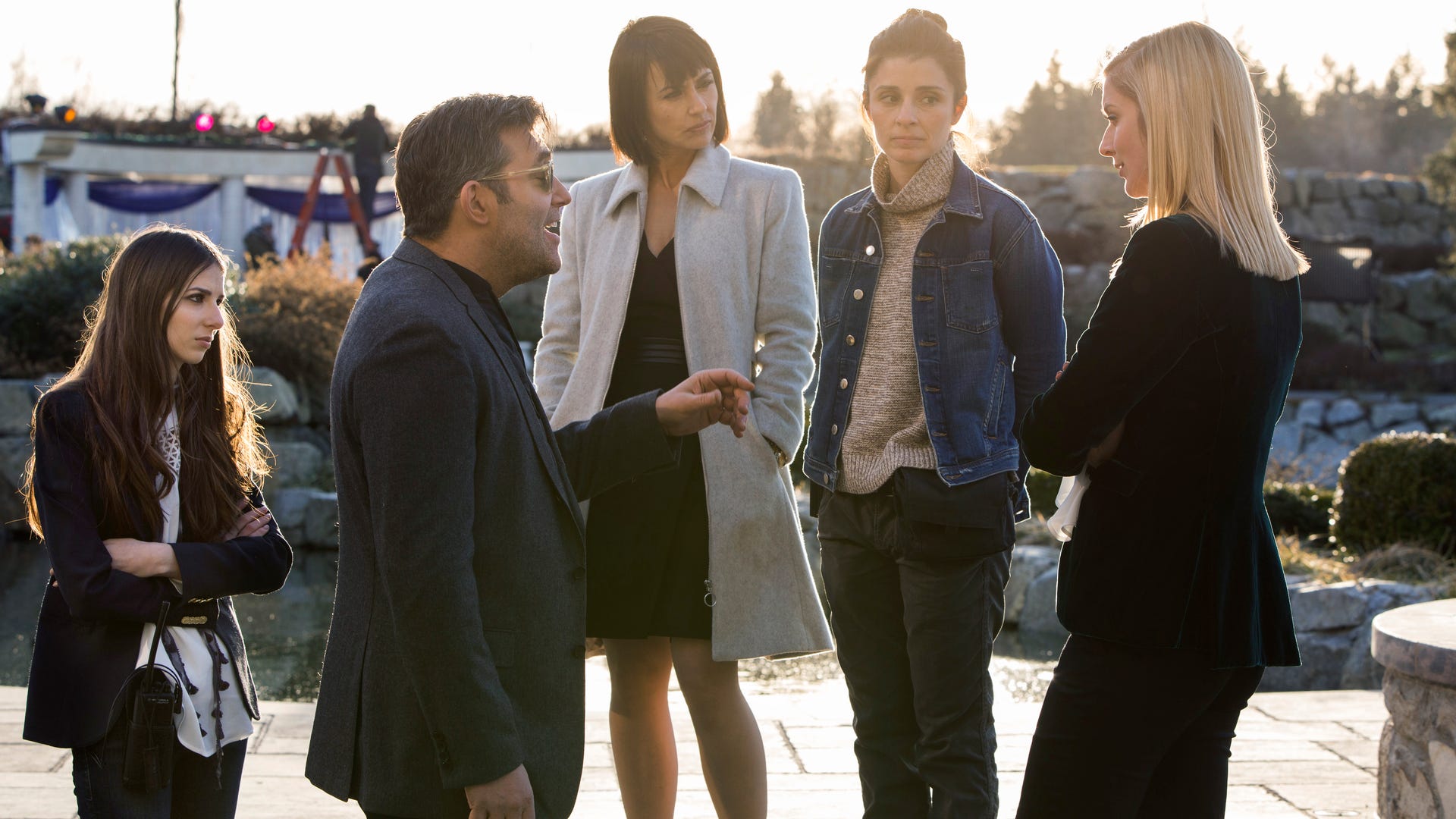Join or Sign In
Sign in to customize your TV listings
By joining TV Guide, you agree to our Terms of Use and acknowledge the data practices in our Privacy Policy.
UnREAL Boss Breaks Down the Show's "Complicated" Potrayal of Feminism
Season 3 is getting into uncomfortable territory
Since it premiered in 2015, Lifetime'sUnREAL- a drama about the behind-the-scenes horrors on a Bachelor-esque reality dating show called Everlasting - has always had a lot to say about the experiences of high-powered women in the workplace. But while feminism has always been an undercurrent of UnREAL, in Season 3, it's front and center. More than ever before, the series is shedding light on some of the inconvenient truths of womanhood in 2018, and navigating the often murky area between being be a "good feminist" and confronting the inescapable pressures and practicalities of modern life.
While previous seasons tended to oversimplify complex conversations for the sake of drama (particularly in Season 2), Season 3 thus far has taken the time to explore some hard truths - namely, that while some women are happy with successful careers alone, that's not the case for all, and probably not even most. The dialogue in many episodes feels like it's been plucked straight out of a third-year women's studies course. This conversation is unfolding due in large part to the incorporation of Everlasting's first female suitor, or "Suitress," Serena Wolcott (Caitlin FitzGerald).
With Serena, UnREAL's new showrunner Stacy Rukeyser is taking the bold step of simultaneously subverting stereotypes and also depicting a hard reality many feminists find themselves grappling with. One might think that, considering her professional achievements, professional power players like Serena have no reason to feel insecure or anything less than content with their lives simply because she's single. But they do. The big question UnREAL is hoping to unpack this season is... why?
"Smart, strong women, we have huge hearts and huge vulnerabilities and huge insecurities as well," Rukeyser says. "That's part of my goal through all of this, is to humanize women like this."
Serena, is a smart, savvy venture capitalist who's put her career first for her entire life, but now feels a pressing need for a partner to stave off a crushing sense of loneliness, is the perfect example of that woman. And Rukeyser once was as well.
"This plight of the career woman not being able to find a man, I experienced it. I was 37 when I met my husband," she tells TV Guide. "I definitely had gotten to a place where I thought it was probably not going to happen for me, I'm probably not going to have kids. And that's OK, because my career is going well. But I was certainly sad about it, and... a little confused about why it had happened for all my friends. They'd all gotten sort of paired up in their 20s and early 30s. Why hadn't it happened for me?"

A similar void in Serena is revealed in the season premiere, after she commits the faux pas of getting drunk and sleeping with one of the contestants on the first night of filming. Afterwards, she's at her most vulnerable, sobbing on the bathroom floor as she explains to producer Rachel (Shiri Appleby) how badly she wants to find a life partner, and lamenting how she's the only one of her friends who hasn't been "picked" by someone yet.
But Serena (like the other women of the show) only reveals her vulnerabilities behind closed doors. In general, she maintains the air of confidence that's gotten her so far in their careers - and it doesn't always serve her well in terms of personal relationships.
On UnREAL, nowhere is this more evident than in Episode 2, when Serena goes on a group date poker game with the male contestants and beats them all handily. She revels in her victory, trash-talking and rubbing it in the guys' faces. This causes the date to come to an abrupt, awkward end as the men sulk off with bruised egos. While Rachel approvingly notes that it seems like Serena can "hang with the guys," Everlasting showrunner Quinn King (Constance Zimmer) snipes: "It's like she's wearing dude repellant!"
Later in the episode, Serena regains the men's affection by taking the advice of misogynistic executive producer Chet (Craig Bierko) and... well, basically acting like a giggling moron. "It's great that you go to the office and you kick ass," Chet tells Serena. "But the woman you are at work is not the girl that a man wants to date."
The sequence aimed to address the juxtaposition of how women are encouraged to act in the workplace (think about books like Lean In and the Maxine Waters "Reclaiming my time" memes) vs. the subservience that's seen as attractive in the dating world.
"Part of the thing that I think is so confusing these days is that, we are really encouraged to be strong at work," Rukeyser says. "And yet, when we go out on a date, we are supposed to magically turn into a completely different creature. Those same characteristics of strength and ambition and taking up space aren't really seen as attractive to many men on a personal or romantic basis."

Rukeyser wanted to nail that bitter frustration any successful woman feels when she's told she needs to minimize or diminish herself in order to be palatable to other people -- whether it be colleagues, friends, or partners. The unREAL team agonized over how to depict Serena in the poker scene, wary of needing to toe the line between making her behavior merely misguided in a cringe-y way, vs. tipping the balance so far that the audience would no longer want to root for her. "We did want to explore some of the difficulties that women like this face, and look at, is some of it coming from the woman herself?" Rukeyser says. "Is it just an unfair bias against women like this, or is there something that we as women are doing that is not helping us in the romantic field?"
"She's desperate not to make another mistake [after her drunken hookup in the premiere], and is trying to apply her business acumen to this job of finding a man," Rukeyser says. "But also, she's incredibly nervous. ... And so, when she's put in a situation where she does feel nervous and insecure, she does kind of revert to some of her protective mechanisms - which, again, can help you at work, where you're tough and you've got a sly comment and you're sassy and all of that."
Later, it's that same nervousness and insecurity, Rukeyser says, that compels Serena to give Chet's method of essentially being a ditz a try. And it works, to a point. (It also prompts Rachel to yell at Quinn for "pumping toxic sludge into the minds of young women [and] telling them that they have to dummy themselves down to land some dude.")
By Episode 3, the sheen has worn off, and Serena gets so exasperated at having to play a damsel in distress (by literally dressing up as a princess and watching the contestants fight over her) that she can't keep up the charade anymore and angrily ditches the costume.
It's a ridiculous concept, played for laughs, but Rukeyser points out that high-earning career women make up a significant portion of the roughly 6 or 7 million people who tune in to The Bachelor and The Bachelorette week after week. "That princess fantasy is attractive to everyone," Rukeyser says. "It's so ingrained in society that even women who are working 40 or 70 or however many hours a week, they still have a fantasy that at the end of it, a man will come along and take them away from all this, and rescue them."
That's an oversimplification of Serena's life goals, to be fair, but the fact that she does feel as though her lack of a partner is some kind of shortcoming is interesting in itself.
"Part of what we were trying to say with this season is that feminism is really complicated," Rukeyser says. "Who is the right guy for Serena? ... Or, does she need to be with anyone at all? Should she be feeling this incredible pull to find a partner? Is that just a natural part of life, or is that an expectation imposed by society? I think that we're just asking a lot of questions, and I think the only answer that we're giving is that feminism is really complicated. But I just think these are the kinds of things we should all be talking about."
UnREAL airs Mondays at 10/9c on Lifetime.
